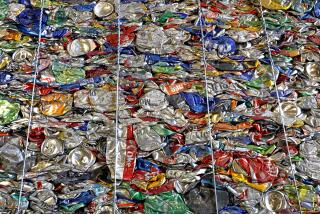Odds ‘n’ Ends, and Pieces of Lives : Many People Sentimentally Attached to Their ‘Junk’
- Share via
Proprietors of self-storage facilities are a lot like the alchemists of yore who tried to turn junk into gold.
But unlike those medieval wizards, owners of do-it-yourself warehouses have found the formula.
And they’re turning quite a lot of junk into gold: 35% to 40% of the estimated $50 million in rent payments hauled in by the county’s storage facility operators each year is generated by so-called “discretionary storage,” the “cubbyholing” of things that otherwise would be headed for the dump.
If it were not for the pack-rat tendencies of the average American family, at least a third of the estimated 100 mini-storage operations in Orange County would be out of business, industry executives say.
People store junk because they become emotionally attached to it or because the replacement cost is high, said Laguna Hills mini-storage developer John Yelland.
“You’ve got your great grandma’s old table, which is falling to pieces. ‘I can’t throw it out so I’m going to put it in my storage unit.’ And then you start doing this with an old rubber boat and an old scuba tank and a bunch of other stuff. It’s like ‘out of sight, out of mind,’ ” he said.
And so the rubber boat rots in the corner until the space is needed for something else.
Making room for more, moving away and running out of money to pay the rent are about the only reasons people clean out their storage rooms.
But when they do, almost anything can go.
Madelyn Morneault, who manages Mini-U-Storage in Irvine with her husband, said she recently found a new television set in the trash.
“If you wait long enough and you’re a manager at one of these places, you can find whatever it is you want in the Dumpster,” she said.
Morneault said tenants’ reasons for packing stuff away are almost as numerous as the tenants themselves.
One of Mini-U-Storage’s more unusual customers is a performer who stores stilts, balls, costumes and other zany paraphernalia, Morneault said. “I’ll look up and he’ll be standing in one of the aisles juggling things or rolling hats up and down his arm,” she said.
Alice Hnatt, co-manager of Save-Most Self-Storage in Mission Viejo, said the most common storage items are household goods--couches, coffee tables and refrigerators.
Many people also stash toys and Christmas gifts that their children have outgrown, she said.
And a few units around the county still are rented out to electric train enthusiasts who need a space for their hobby, and to people whose homes and garages aren’t large enough for their pool tables or workshops.
Mini-storage managers said businesses--which rent about 30% of the county’s storage units, generally the largest ones--often store boxes full of file records. Some also cart in their wares or equipment.
Morneault said restaurants often rent space to store chairs, tables and stoves. And some hotels pack away beds, dressers and night tables.
Morneault added that some tenants store a piece of their lives away. An older couple might walk in and, tears streaming from their eyes, explain that they need a unit to store their belongings because their children asked them to leave. The couple might rent the unit next to the one leased by a newly divorced man, jubilant over his new-found freedom and in need of a place to hold his possessions while he looks for a new home.
“Before we started working here, I’d pass a storage place on the street and think, ‘What a boring place to work.’ It’s not at all,” Morneault said. “A storage place is where people bring their problems a lot of times. Working here is a lot like being a bartender.”
More to Read
Inside the business of entertainment
The Wide Shot brings you news, analysis and insights on everything from streaming wars to production — and what it all means for the future.
You may occasionally receive promotional content from the Los Angeles Times.










